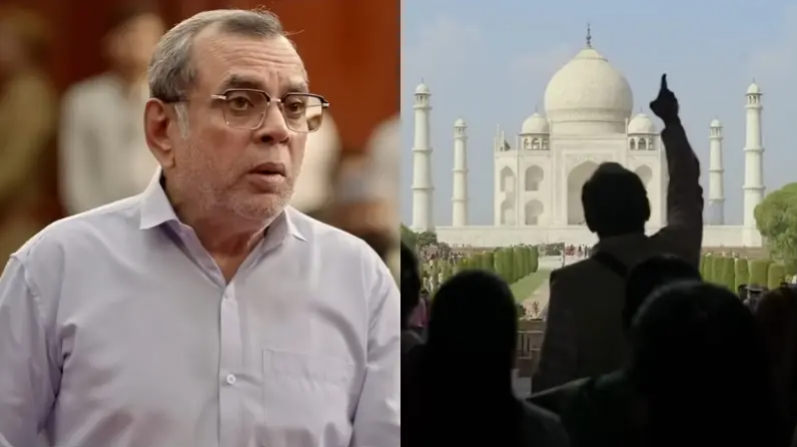Veteran Bollywood actor Paresh Rawal returns to the big screen — not as the comic relief or grumpy uncle he’s known for, but in a role that’s bound to make historians wince.
Titled The Taj Story, the film, directed by Tushar Amish Goel, is set to release on October 31 and claims to be “inspired by true events.” It questions the well-documented history of the Taj Mahal and its Mughal creator, proposing a theory long dismissed by historians and India’s Archaeological Survey (ASI).
The trailer opens with Rawal as a tour guide at the iconic monument. When a vendor asks him which temple he’s headed to, he replies, “The Taj Mahal.” What follows is a flood of revisionist dialogue and pseudo-historical claims.
In one striking scene, Rawal’s character quips, “Have you ever seen a monument with both a dome and a kalash?” He goes on to suggest that perhaps “the Taj Mahal needs a DNA test.”
Dramatic music follows, as courtrooms, protests, and viral slogans take over the screen — including the film’s most controversial line: “Taj Mahal is not a symbol of love; it is a symbol of atrocity and genocide.”
The story follows Rawal’s character as he defends himself in court, cross-examining historians for allegedly concealing the “truth” behind the Taj Mahal’s origins. Central to his case are the 22 locked rooms beneath the monument, which he claims contain Hindu symbols.
That theory, however, has been repeatedly disproven. According to the ASI, those rooms are simply sealed maintenance corridors — standard architectural features in Mughal-era buildings.
Former ASI regional director KK Muhammed has confirmed, “I’ve been inside those rooms. There are no religious motifs — they’re purely structural spaces.”
The Taj Story is part of a growing wave of Indian films that mix mythology, politics, and selective history to appeal to nationalist sentiments.
Goel, known for his earlier film glorifying Prime Minister Narendra Modi, again taps into ideological storytelling — reimagining the Taj Mahal, long celebrated as an emblem of love, as a monument of “atrocity.”
The film reflects the current political climate in India, where rewriting history has become an industry of its own.
For many viewers, The Taj Story may not really be about the Taj Mahal itself, but about the ongoing struggle over who defines India’s past — and what symbols like the Taj are meant to represent.



